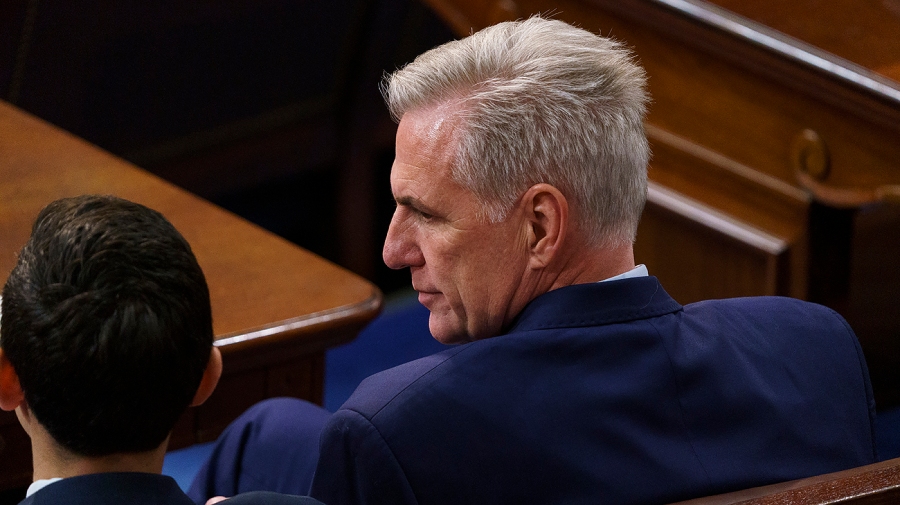Just In | The Hill
The nasty battle over electing Rep. Kevin McCarthy as the next Speaker is sparking alarm among Senate Republicans who fear the California Republican’s failure to win enough support after multiple votes portends serious problems ahead in the new 118th Congress.
Senate Republicans voiced their confidence in McCarthy when he met with them in the Capitol shortly before Christmas but his failure to budge a group of hard-line conservatives after making major concessions over the weekend on a rules package has them wondering how he can lead.
McCarthy’s inability to unify his conference on the first organizing votes of the new Congress is raising doubts about his — or any Republican Speaker’s — ability to pass debt-limit legislation and appropriations bills this year.
“Don’t they realize how embarrassing this is? Is that possible, that people think about that?” asked Sen. John Cornyn (R-Texas) incredulously when informed that Rep. Matt Gaetz (R-Fla.) had nominated Rep. Jim Jordan (R-Ohio) for Speaker moments after Jordan himself delivered an impassioned speech to nominate McCarthy for the job.
“If it’s this hard to elect a Speaker, imagine how hard it’s going to be to pass any legislation,” Cornyn added.
He noted the one silver lining for Republicans is that Democrats will no longer be able to pass massive spending bills, such as the $1.9 trillion American Rescue Plan, with party-line votes under the budget reconciliation process, as they did when they controlled the House.
Republican senators were left scratching their head Tuesday afternoon how the group of 19 House GOP conservatives would find a way out of the stalemate after blocking McCarthy.
“The question is, ‘How do they land the plane?’ and I’m not sure there’s any obvious answer,” Cornyn said.
Sen. Lindsey Graham (R-S.C.) said House Republicans will “eventually” elect a Speaker but acknowledged “it’s not a good start” to the new Congress.
“At the end of the day, you’re not going to pass a bill out of the House that Biden will sign, I doubt,” Graham predicted.
“The bottom line is, what’s the end game here?” he asked.
Graham said he thought McCarthy went too far in trying to appease conservative critics by offering a rules package with several major concessions, including dropping the number of disgruntled Republicans needed to offer a motion to oust the Speaker to five members.
“I think Kevin’s already given away too much,” Graham said.
Senate Republican Whip John Thune (S.D.), who served in the House from 1997 to 2003, said he still though there was a path to the Speakership for McCarty, though “it’s definitely a speed bump.”
“This is the first important step in getting organized so I hope they can get this behind them and we can get a functioning, effective majority in the House because it’s going to be essential and necessary for us to get things done around here.
“They’re off to a slow start over there but hopefully they’ll figure out a way to come up with a path forward,” he added.
The disarray in the House GOP conference served as a stark contrast to the Senate, where Senate GOP Leader Mitch McConnell (R-Ky.) on Tuesday surpassed late Sen. Mike Mansfield (D-Mont.) as the longest serving Senate leader in history.
McConnell made no mention of the GOP infighting when he spoke on the floor Tuesday, and instead used his time to pay tribute to Mansfield, whose low-key leadership style of resolving conflicts behind closed doors is one the Kentucky senator has often emulated.
McCarthy asked Republican senators to trust his ability to manage the House when he met with them on Dec. 21. He did so after Senate Republicans cited concern about McCarthy’s ability to govern a narrow majority in 2023 as a major reason to vote for a year-end $1.7 trillion omnibus package.
Now those concerns are looking more well-founded, GOP senators and aides said.
One Republican senator who requested anonymity to comment on McCarthy’s battle with House conservatives said it doesn’t bode well for getting bills passed in 2023 and 2024.
“This is just further evidence of how difficult in this divided Congress it’s going to be to pass legislation,” said the lawmaker, who added that McCarthy’s challenges exceed those faced by former GOP Speakers John Boehner (Ohio) and Paul Ryan (Wis.).
“For the House to function, the Speaker has to have authority and this demonstrates the next Speaker, whoever it is, doesn’t have the authority to manage the House,” the source said.
The biggest challenge looming this year is a vote to raise the nation’s debt limit to avoid a default. That vote is expected to take place in the summer or fall.
The last time Republicans captured the House majority in the 2010 midterm election, the ensuing stalemate between the Republican-controlled House and the Democratic-controlled Senate and the Obama administration brought the nation within days of a potential default.
Congress came so close to potential fiscal disaster that Standard and Poor’s downgraded the United States’ credit rating in August of 2011.
Passing the annual appropriations bills will present another major challenge.
If elected Speaker, McCarthy will likely have to rely on Democratic votes to pass debt-limit or spending legislation as a number of House Republican conservatives routinely vote against these bills.
But bringing bills that add to the nation’s debt to the House floor and passing them with Democratic votes is likely to spark new battles with the conservative House Freedom Caucus.
Graham warned that if the Republican-controlled House can’t pass individual spending bills it will be a “failure.”
Sen. Thom Tillis (R-N.C.) said his anxiety about potential fiscal disaster in 2023 will depend on whether House conservatives realize they’ll need to give some ground on issues.
“It depends on whether or not they realize we’re in divided government and that’s going to necessarily move us away from preferred positions to the best we can negotiate,” he said. “Things like funding the government, addressing the debt ceiling are not things you can defer.
“You either do it or you don’t and we got to do it over the next six to nine months,” he said, referring to the looming must-pass bills.
Senate, House, News, Debt limit, House Speakership vote, John Cornyn, Kevin McCarthy, Lindsey Graham, Mitch McConnell Read More
Author Profile
Latest entries
 HeadlinesSeptember 30, 2024Rob Gronkowski left confused as 'FOX NFL Sunday' crew pulls off hilarious prank: 'Whoa!'
HeadlinesSeptember 30, 2024Rob Gronkowski left confused as 'FOX NFL Sunday' crew pulls off hilarious prank: 'Whoa!' ScienceSeptember 30, 2024‘Gut instinct’ may help you avoid scams
ScienceSeptember 30, 2024‘Gut instinct’ may help you avoid scams HeadlinesSeptember 30, 2024Gen Z voters could stay home this November thanks to one key issue: 'A lot of people' don't like this
HeadlinesSeptember 30, 2024Gen Z voters could stay home this November thanks to one key issue: 'A lot of people' don't like this HeadlinesSeptember 29, 202410 fun facts about Mars, also known as the red planet
HeadlinesSeptember 29, 202410 fun facts about Mars, also known as the red planet

